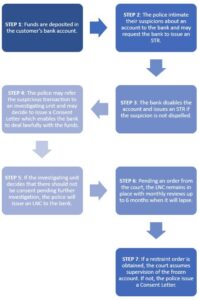In the case Tam Sze Leung v Commissioner of Police [1], the Hong Kong Court of Final Appeal (“CFA”) unanimously upheld the “Letters of No Consent” (“LNC”) regime, as operated by the police under the Organized and Serious Crimes Ordinance (Cap. 455) (“OSCO”). The LNC regime essentially involves an exchange between the banks and police whereby the police:
- intimate to a bank their suspicions about an account and request the bank file a Suspicious Transaction Report (“STR”); and
- subsequently issue an LNC, thereby putting the bank on notice of possible liability under OSCO (i.e., for “dealing” in suspicious transactions without consent).
The CFA’s decision confirms that this practice does not involve the police “freezing or ordering banks to freeze the accounts”. Instead, the police’s actions are “lawful measures to prevent the crime of money laundering”. The clarification will be welcomed particularly by victims of fraud, as the LNC regime provides a speedy means of preserving crime proceeds before a restraint order / Mareva injunction can be obtained from the courts.
Background
The appellants, who came from the same family, were suspected of involvement with market manipulation in relation to some Hong Kong stocks, with the profits being transferred to their bank accounts. The police informed the banks of their suspicions regarding the funds and requested the banks file STRs. The police issued an LNC, and the banks disabled the accounts.
In the judicial review initiated by the appellants, the Court of First Instance held that the LNC regime was ultra vires and unconstitutional,[2] but the decision was overturned by the Court of Appeal (“CA”)[3]. For details on the CA’s decision, please see our previous article published on KWM’s website.
The CFA decision
After reviewing the statutory and regulatory anti-money laundering scheme in Hong Kong (including an analysis of the relevant OSCO provisions), the CFA set out a seven-step sequence of events to illustrate the operational practice of the police in relation to the LNC regime as follows[4]:

The appellants argued that the LNC regime, focusing on steps 2 and step 5 above, is ultra vires because “OSCO does not confer power to operate a de facto property freezing regime”. The CFA identified three flaws of this argument:
- Firstly, the source of the police powers regarding steps 2 and 5 does not come from the OSCO. Instead, it derives from the Police Force Ordinance, which provides for the police’s duty to “take lawful measures for preventing and detecting crimes and offences”.
- Secondly, to say that the police were “freezing” a customer’s account was a mischaracterisation. The CFA reaffirmed that the decision rests with the bank:
“… motivated by the wish to meet its anti-money laundering obligations and to avoid criminal, regulatory and reputational sanctions, it is the bank which disables and freezes its customer’s account when it decides that the suspicion is not dispelled.”
- Thirdly, the CFA did not accept that the only lawful means of preventing flight / dissipation of suspect funds, was by obtaining a restraint order from the court. The evidential threshold for obtaining such an order pre-supposes a well-advanced investigation, and if accepted that argument would produce
“… a surprising and crucial gap […] during the period before investigations are sufficiently advanced to justify applying for a restraint order, when nothing could lawfully be done to prevent flight or dissipation of the suspect funds.”
The CFA also rejected the other grounds raised by the appellants such as improper purpose, lack of fair hearing and the infringement of property rights for similar reasons. Even if the freezing of account was the police’s doing, the CFA was satisfied that the interference with property was temporary, made pursuant to legitimate anti-money laundering aims and thus proportional.
Previously, the CA in Interush Ltd v Commissioner of Police[3] had already rejected a challenge to the constitutionality of the relevant provisions in OSCO (sections 25(1) and 25A). Therefore, the CFA decision in Tam Sze Leung should now be the final word on the LNC regime.
For more information on the implications of reinstating the LNC regime, refer to our earlier alert on the Court of Appeal’s decision.
[4] At [45].








